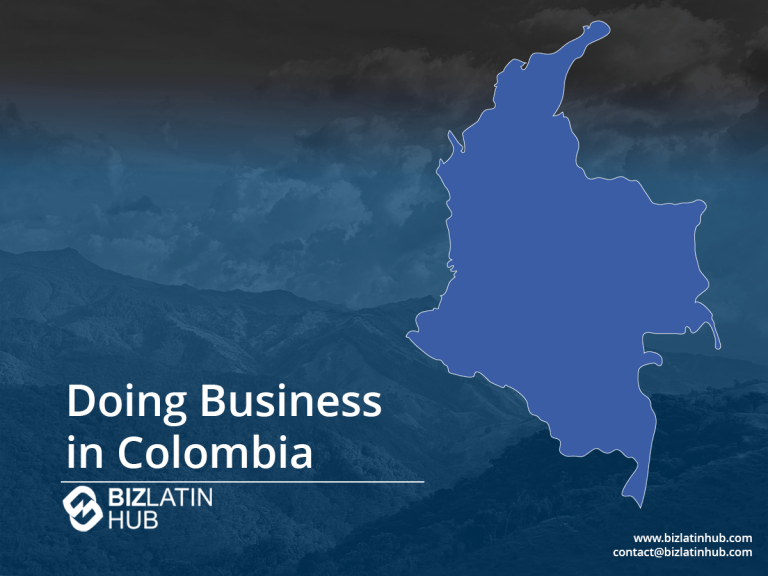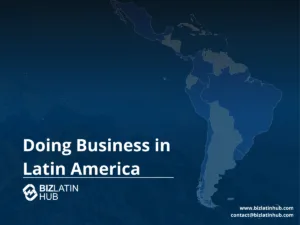Find out how to register a trademark in Colombia to protect your business and its distinctive signs. This includes conducting a comprehensive search in Colombia to ensure yours is unique. Registering a trademark in Colombia grants exclusive rights to use the mark, providing legal recourse against infringement.
Colombia is fast becoming one of Latin America’s hot spots for foreign investment and business expansion. Of late, the Colombian government has worked hard to offer investment incentives in a number of sectors and industries. Key to the success of these businesses is strong intellectual property rights to protect ideas and inventions. If you want to incorporate a company in the country, you will likely want to register a trademark in Colombia.
Local bureaucracy can be tricky to navigate, especially for those unfamiliar with the lay of the land. That’s why it pays to team up with a specialist like Biz Latin Hub to register a trademark in Colombia, especially for the first time. We can guide you through the process from start to finish and provide your business with ongoing support through our array of back office services.
Why should I establish my brand in Colombia?
Your brand is the image that distinguishes your products and services from those of any other business. You must direct your market on how you wish to be perceived, by using specific words, images, forms, and sounds.
Register a trademark in Colombia to protect your brand, as well as its core goods and services, when doing business in the country. Doing so ensures your business stays unique and well-covered from potential piracy.
Register a trademark in Colombia to protect intellectual property
In comparison to its regional counterparts, Colombia offers strong investor and intellectual property (IP) protection policies, and tax incentives to foster a responsive business environment in this emerging market.
Colombia’s IP framework is supported by several resolutions aimed at improving local protections for people and businesses. The country subscribes to the Andean Regime, whereby Andean Law rulings apply to local law. Under this system, the Andean Law 486 of 2000 is the prevailing IP law for Colombia’s people and businesses. The country has also ratified or committed to the following international IP regulations:
- Patent Prosecution Highway agreement with the United States
- Universal Copyright Convention
- World Trade Organization’s Trade-Related Aspects of Intellectual Property Agreement
- Geneva Convention for Protection of Sound Recordings
- Paris Convention on Industrial Property
- Budapest Treaty on International Recognition of the Deposit of Microorganisms for the Purposes of Patent Procedure
- Berne Convention for Protection of Literary and Artistic Works
- Brussels Convention on Distribution of Satellite Signals
- World Intellectual Property Organization (WIPO) Copyright Treaty
- WIPO Performances and Phonograms Treaty
- Patent Cooperation Treaty
- Trademark Law Treaty
- Protocol Relating to the Madrid Agreement Concerning the International Registration of Marks
Colombia also made amendments to its Copyright Act of 1982 to extend copyright protection from 50 to 70 years.
Definitions: copyright and trademark in Colombia
In Colombian law, copyright protects the creations of literary and artistic works such as books, music, painting, sculpture, films, computer programs, databases, commercials, maps and technical drawings.
Trademarks cover the distinctive signs intended to differentiate the products or services of one company from those of another.
How is the renewal process of a trademark in Colombia?
The renewal of a trademark registration must be requested either within six months before the expiration of the 10-year grant term or during a grace period of six months after the expiration. Failure to request renewal within this timeframe will result in the trademark becoming expired.
What is the difference between industrial property and copyright?
The crucial difference between these two fields falls on the ultimate goal of each of them. On the one hand, copyright protects that intimate relationship between the author and intellectual creation, while industrial property covers the application of intangible assets in industry and commerce.
The main objective of having distinctive signs are that a business’ consumer recognizes the brand and story behind the products and services offered in the market, and develops loyalty towards new or creative products or services. This is the outcome of the goals behind building creative content.
Compatibility of trademarks and copyright in Colombia
The relationship of law between trademarks and copyright is not always clear. If a figurative mark is registered, for example, this is already a legally protected piece of work and therefore its author already has rights over it. It’s not necessary then that the owner seeks additional recognition by any authority. The brand must always be distinctive, while the copyright does not value the merit of the work, but only its existence in itself and the relationship it has with its creator.
Before registering a trademark in Colombia
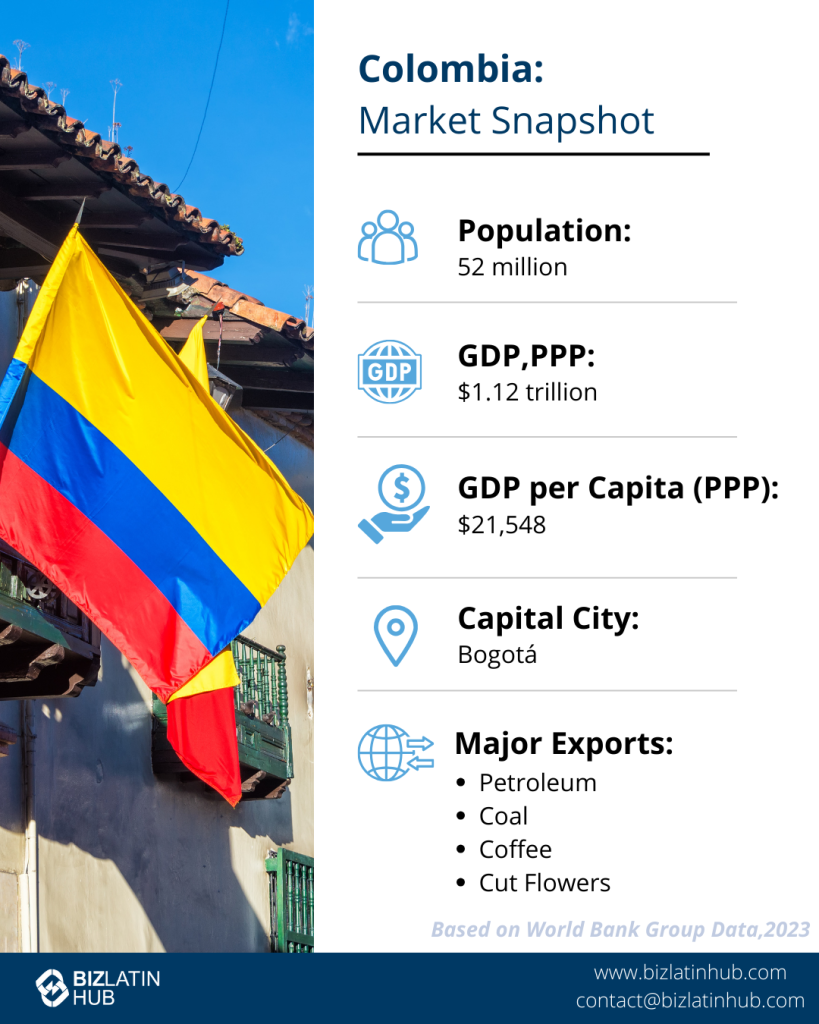
To successfully complete the process of trademark registration in Colombia, it is not mandatory to hire a lawyer. However, bear in mind that beginning commercial activity, including registering your business and its trademarks, does require a comprehensive understanding of local law. To navigate the process, it is recommended you seek assistance from local experts who can guide you and ensure your commercial activity is properly protected.
During the trademark registration process, you must be prepared to respond to any declarations of opposition from third parties. These may be people or businesses with trademarks for similar ideas already in place. Colombia’s Industry and Commerce Superintendency, known locally as Superintendencia de Industria y Comercia (SIC), will make the final decision on the validity of any and all objections to your application. You must ensure that you can demonstrate the key differences in your idea, invention, or procedure to other similar competitors, if any.
Our recommendation: Working with an experienced trademark attorney is crucial to successfully secure the registration process and increase the chances of a favorable outcome. At the same time, it is recommended to monitor the trademark once registered to detect any unauthorized use or infringement, which will allow you to act quickly to safeguard your trademark rights.
Conduct a trademark search in Colombia
Make sure to conduct a thorough trademark search in Colombia before submitting your application. You may need the help of a local trademark law specialist to undertake the search on your behalf.
The trademark search will involve checking current registered trademarks in the country. It is crucial to confirm that your distinctive signs are unique and available in order to avoid potential legal issues or objections from third parties during the trademark application process.
3 Steps to register a trademark in Colombia
In Colombia, you can undertake your trademark registration process in-person at the offices of the SIC, or digitally through the SIC website. You should undertake this process only after you have conducted the trademark search in Colombia.
Ensure you have the required documentation and a comprehensive outline of your business activities and follow due process when registering your trademark.
The 3 steps to register your trademark in Colombia are the following:
- Step 1 – Trademark search in Colombia
- Step 2 – Classify the products and/or services.
- Step 3 – Submit relevant documents.
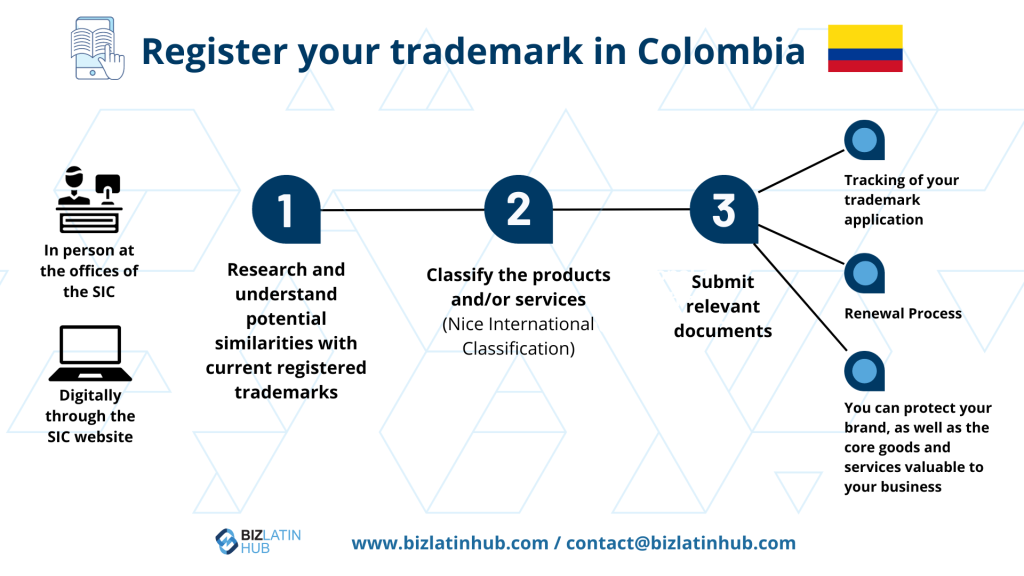
1. Trademark search in Colombia
As mentioned above, your application will be open to scrutiny by other businesses. It is therefore crucial to undertake a thorough trademark search and understand potential similarities with current registered trademarks. Identify and present the salient differences between your business and others, and you will have a greater likelihood of success in your application.
Statistics on application success are presented on the SIC platform, or through a request to the agency itself.
2. Classify the products and/or services
You must be clear about the classification for the products and/or services that you want to register a trademark for. In Colombia, goods or services are categorized according to the Nice International Classification, administered by the World Intellectual Property Organization.
3. Submit relevant documents
The presentation of all documents and forms can be done physically (at any point of Attention) or by virtual means through the Virtual Office of Industrial Property (SIPI).
Documents to submit include:
- Identification of the owner of the trademark: this can be demonstrated with a Certificate of the Chamber of Commerce.
- Power of Attorney (POA): if you have chosen to seek legal guidance through this process, you must show the identification and authentication of your legal representative. Authentication can be achieved through a Colombian notary, and if the POA is a foreigner, this must be apostilled.
- A completed form containing the category of the products/services according to Nice Classification. If required, you must present the image, letters, or sound you wish to trademark.
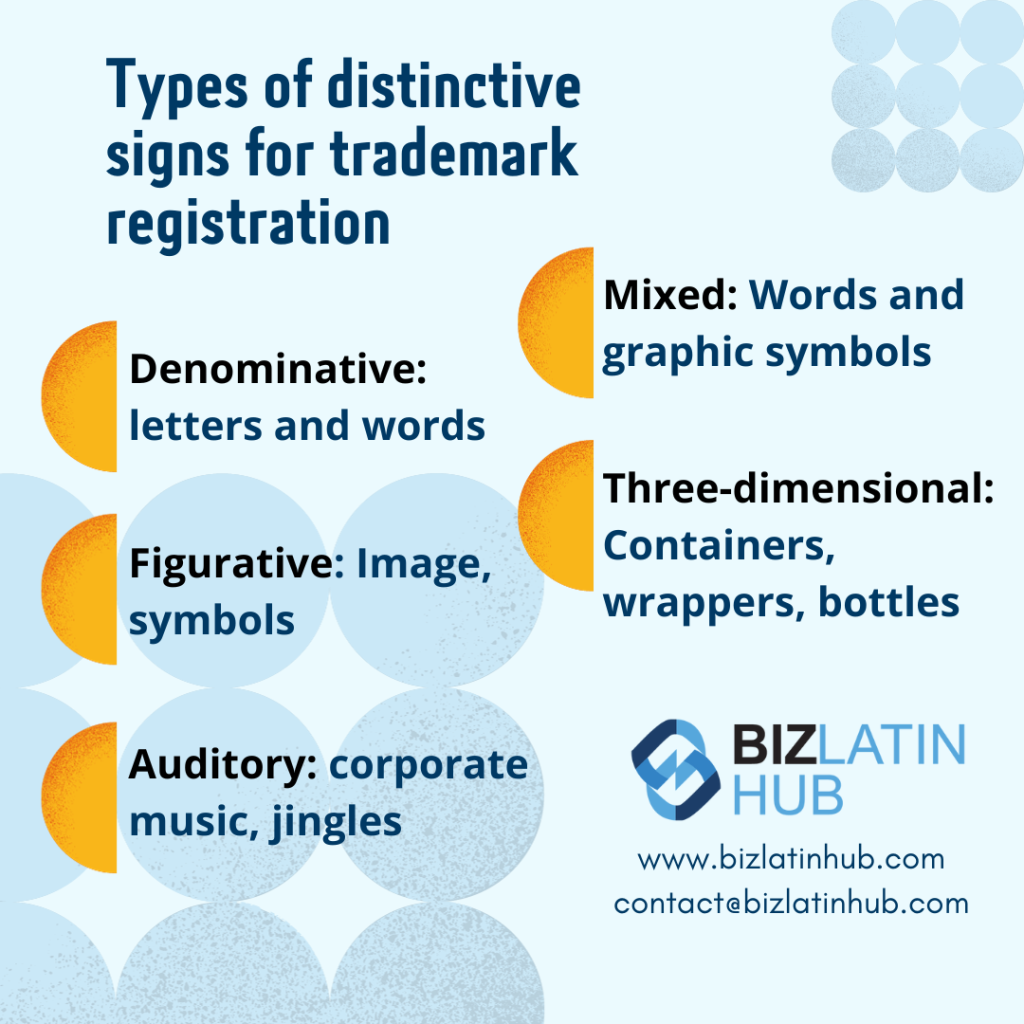
FAQs on how to register a trademark in Colombia
Based on our extensive experience these are some common questions from clients who are registering a trademark in Colombia:
1. What are the requirements to register a trademark in Colombia?
- The Applicant’s contact information (Business name, business ID number, country of incorporation, phone number, office address, email address, etc.).
- Determine the class of your products/services to be registered in the International (Nice) Classification of Goods and Services.
- -A detailed description of the brand, its origin, design, general description, and business activity.
- The date at which you commenced using your brand commercially.
- If you wish to register your logo along with your brand, we request that you provide the logo in JPG format.
2. How long does it take to register a trademark in Colombia?
The timeframe to register a trademark is 6 months, provided there is no opposition from third parties.
3. Can I renew my trademark indefinitely in Colombia?
Trademarks in Colombia are initially registered for ten years and may be renewed indefinitely for successive ten-year periods. We recommend that renewal applications be filed within six months prior to the expiration date or within a grace period thereafter.
4. Do I need legal representation to register a trademark in Colombia?
Although not mandatory, engaging the services of a qualified attorney or intellectual property agent can facilitate the registration process and ensure compliance with regulatory requirements, thus mitigating potential pitfalls or complications.
5. What are the steps to register a trademark in Colombia?
The 3 steps to register your trademark in Colombia are the following:
- Step 1 – Trademark search in Colombia
- Step 2 – Classify the products and/or services.
- Step 3 – Submit relevant documents.
6. What remedies are available for trademark infringement in Colombia?
In cases of trademark infringement or unauthorized use, trademark owners in Colombia may seek various remedies, including damages and seizure of the infringing goods. Legal actions may be pursued through civil or criminal proceedings, depending on the nature and gravity of the infringement.
7. What is a trademark search in Colombia?
A trademark search in Colombia is undertaken to confirm within the chosen jurisdiction the commercial existence of the name in use.
Biz Latin Hub can help you register a trademark in Colombia
Colombia offers myriad opportunities for foreign investment and entrepreneurial success within its borders, and in dealing with its key international partners. The country’s stable government and pro-business mindset draw increasing levels of foreign commercial actors to its largely untapped markets.
Regardless, expanding to Colombia requires attention to and understanding of local laws. Newcomers should seek local support and expertise while applying to register a trademark in Colombia, especially the first time.
Biz Latin Hub provides key knowledge and local experience to foreign businesses in Colombia and Latin America. We provide market entry and back-office services tailored to your business needs.
Reach out to our friendly Colombia team for personalized assistance and help registering your trademark in Colombia.

